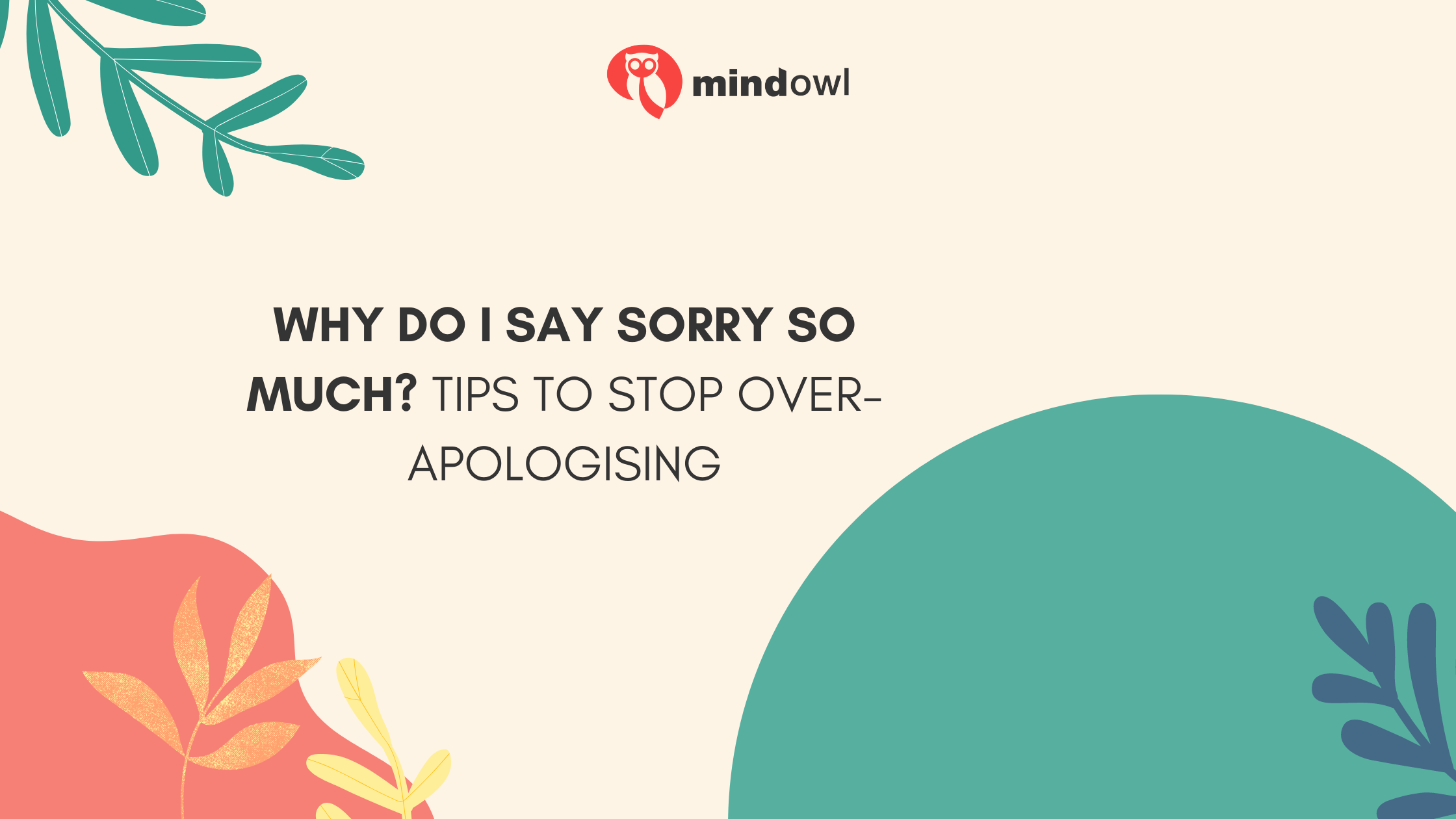Have you ever found yourself saying sorry for things that aren’t even your fault? You’re not alone. Many of us have the habit of over-apologising, even in situations where an apology isn’t needed.
This can leave us feeling drained and can make others view us as less confident.
Interestingly, research shows that apologising too much might make people like you more, but it comes at a cost to how you see yourself and your position in both personal and professional relationships.
In this article, we’ll explore why we often find ourselves trapped in a cycle of saying sorry all the time. From understanding the root causes to learning strategies to curb excessive apologising, we aim to equip you with insights and tools to help assert your confidence while maintaining genuine connections.
Ready to change? Keep reading.
Key Takeaways
- Many people often say “sorry” too much because they have low self-esteem or fear conflict.
- Saying sorry when it’s not needed can harm your self-esteem and make you seem less confident.
- Over-apologising can prevent real communication in disagreements, making it hard for relationships to grow stronger. People use apologies to avoid conflict instead of addressing the actual issue.
- Reflecting on why we over-apologise helps identify patterns that need changing.
- Building self-confidence and being assertive involves recognising your worth, speaking up without saying sorry, and respecting your own boundaries.

Understanding Over-Apologising
Reasons for excessive apologising
Many people say “sorry” too often because they have low self-esteem. They might think they are always at fault or not good enough. This leads to saying sorry even when it’s not needed.
Fear of conflict is another big reason. Some prefer to apologise rather than face potential arguments or disagreements.
Childhood experiences and mental health issues like anxiety or depression can also make someone apologise more than necessary. Growing up in an environment where making mistakes was heavily criticised may create the habit of constant apologising.
Similarly, those who feel anxious may use “sorry” as a way to ease their nerves, wrongly believing that by apologising, they’re fixing things or preventing anger from others.
Over-apologising as a trauma response
People who have faced trauma might say sorry too much. This happens because they feel guilt, shame, or lack self-confidence. These feelings come from tough times in their past, like abuse or mistreatment.
Saying sorry a lot can be their way to deal with these memories.
To help themselves, people who over-apologise should know that they are safe now. Reminding themselves of this can make them less likely to keep saying sorry for everything. Talking to someone about their feelings is another good step. This can make them feel understood and less alone.
The Impact of Over-Apologising
How over-apologising can affect self-esteem
Saying sorry too much can make a person feel like they’re not good enough. It often starts with thinking everything is their fault, even when it’s not. This constant apologising becomes a habit that lowers self-esteem over time.
People start to see themselves as someone who always makes mistakes and needs to ask for forgiveness. They might feel they aren’t perfect or worthy because of this habit. Apologising all the time can also show others that you lack confidence. In places like work, it may seem as if you are less capable than your colleagues. This perception can affect how people treat and respect you.
Over time, the cycle of constantly saying sorry puts a dent in how valuable and assertive one feels about oneself – making stepping up or sharing ideas harder due to fear of being wrong again.
The role of over-apologising in conflict avoidance
Over-apologising plays a big role in avoiding disagreements. People often say “I’m sorry” too much because they want to keep peace. They fear that being honest might start a fight.
So, they choose to apologise even when it’s not needed. This habit can make someone appear less confident and might stop true feelings from coming out.
Using “sorry” as a shield stops real communication. It can turn into a pattern where someone always takes the blame to avoid any tension. But this doesn’t solve the problem or help relationships grow stronger. Trying to dodge conflict by overusing apologies may seem like an easy fix, but it often does more harm than good.

Strategies to Stop Over-Apologising
Reflecting on patterns of over-apologising
Looking at why we say “sorry” too often is key. It helps us spot habits we might not notice. This can be saying “I’m sorry” for things out of our control, or just to avoid conflict.
People do this more than they think. They may feel it keeps peace or shows they care. But, it’s good to question if we’re truly at fault before apologising.
Finding alternative ways to express ourselves instead of always saying “sorry” is important too. For example, saying “Thank you for waiting” feels better than a needless apology. It acknowledges someone’s patience without placing blame on oneself.
Practising alternative responses to “I’m sorry”
Saying “I’m sorry” too often can make you sound insecure or undermine your credibility. Instead, express gratitude when appropriate by saying “Thank you for your patience” or “I appreciate your flexibility.” This shifts the tone in a more positive direction.
When you’ve made a mistake, take responsibility without demeaning yourself. Say something like “I take full responsibility for this error” or “You’re right, I missed that detail. Let me revisit it.” Then offer a solution by continuing with “Going forward, I will…” This shows you’re proactively resolving the issue.
If you simply need to assert your perspective, do so confidently without apology. Phrases like “Here’s how I see this situation…” or “My view is that…” allow you to share your stance directly yet respectfully. Avoid weak language that undermines your message. Project confidence by owning your views.
Encouraging self-confidence and assertiveness
Boosting your self-confidence and being more assertive starts with small steps. Begin by recognising your worth. Everyone has the right to express themselves and take up space in this world.
Remind yourself that you’re speaking up because your opinions matter.
Practice saying no or stating what you need without adding “sorry” at the end. This shows others that you respect your own boundaries and expect them to do the same. Over time, these actions can help you feel stronger in social situations and reduce the urge to over-apologise, leading to healthier relationships where mutual respect flourishes.
Conclusion
Over-apologising can harm how others see you and affect your self-image. Saying sorry excessively is linked to trauma responses and low self-esteem. It’s okay to apologise, but it’s also okay not to take the blame when it’s unwarranted.
Reflect on patterns of over-apologising and practice alternative responses to “I’m sorry.” Recognise when you’re over-apologising and make a conscious effort to stop.
FAQs
1. Why do people apologise too much?
People tend to apologise too much because they might feel insecure, have low self-esteem, or believe everything is their fault. It’s often a learned behaviour from childhood or a way to seek approval from others.
2. How can I stop saying sorry all the time?
To stop over-apologising, try to recognise when you really need to say sorry and when you don’t. Use phrases like “thank you for your patience” instead of “I’m so sorry” for situations that aren’t your fault.
3. Is apologising too much a sign of anything serious?
Yes, excessively apologising could point towards deeper issues such as poor boundaries, self-esteem problems, or even past traumas. If you find yourself doing it obsessively, talking to someone about it might help.
4. What can I say instead of “I’m sorry”?
Instead of saying “I’m sorry,” consider using expressions like “thank you” for understanding situations differently – this shifts the focus from blame to appreciation.
5. Does constantly apologising affect how people see me?
Indeed – constantly apologising may make others perceive you as less confident or assertive. It’s important to express yourself without feeling the need to take unnecessary blame.
6. Are some people more likely to over-apologise than others?
Research suggests women and individuals with certain personality types are more prone to apologise profusely — often due to societal expectations or personal tendencies towards wanting peace and reassurance.
MindOwl Founder – My own struggles in life have led me to this path of understanding the human condition. I graduated with a bachelor’s degree in philosophy before completing a master’s degree in psychology at Regent’s University London. I then completed a postgraduate diploma in philosophical counselling before being trained in ACT (Acceptance and commitment therapy).
I’ve spent the last eight years studying the encounter of meditative practices with modern psychology.


